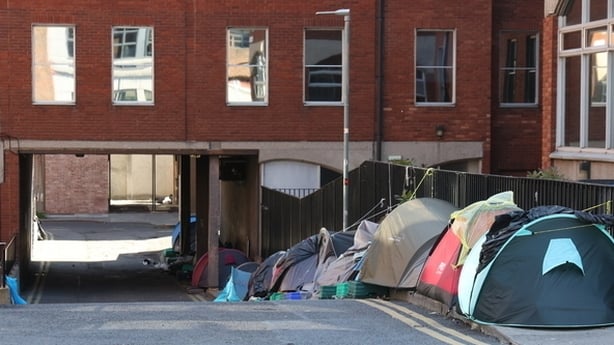Asylum seekers who cannot get accommodation will get a weekly payment of €75 under a plan going to Cabinet tomorrow.
Government sources have described the measure as temporary and it is in line with what is on offer in other European Union states.
It comes as Tánaiste Micheál Martin said the Government is "very concerned" about the prospect of asylum seekers sleeping in tents and the associated health and safety risks, the Tánaiste has said.
32 international protection applicants were not offered State-provided accommodation when they presented to the International Protection Office.
The figures, up to close of business, were provided to RTÉ News by the Department of Integration.
Earlier, the Department of Integration said it can no longer provide accommodation to all international protection applicants due to a severe shortage.
In a statement, a spokesperson for the department said tents and sleeping bags will be provided to people where required.
A total of 107 people were accommodated over the weekend, however from today, the State is not in a position to accommodate everyone.
Earlier a spokesperson had said women and children will still be accommodated.
Over 100,000 people are currently being accommodated in Ireland.
Just over 74,000 of those are Ukrainians who have fled the war there, while there are also around 26,000 international protection applicants.
The department said that "various issues" that are beyond its control have led to accommodation shortages.
It confirmed that drop-in day services will be available to people offering them access to showers, meals, and laundry services.
This evening, a department spokesperson said that it is "actively engaging with stakeholders to prevent unaccommodated international protection applicants from becoming street homeless".

Mr Martin described the situation as challenging and said the Government will be meeting later this week to assess the matter.
Speaking to reporters, he said the war in Ukraine and those fleeing from it has had an enormous impact on available accommodation.
He said the numbers reflect significant instability across the world and said Ireland, domestically, will continue to meet its legal and international obligation and do all it possibly can to provide accommodation.
Asked if the Government could have anticipated those numbers, he said it was not as simple as providing housing overnight.
Yesterday, Minister for Integration Roderic O'Gorman said that additional support measures were being worked on, including increasing the weekly allowance of €38.80 paid to international protection applicants, if they are not offered accommodation and measures to "identify (asylum seekers) who are sleeping rough and end that".
Asylum seekers arriving here fear they will be living on the streets
The Head of Office with UNHCR Ireland said the news was "extremely concerning" and "disheartening", particularly as the Christmas period approaches and weather conditions disimprove.
Enda O'Neill told RTÉ's News at One: "This is not the first time this has happened between January and June this year over 1,500 asylum seekers were not initially offered accommodation when they arrived in the state.
"And our experiences at that time are a great cause of concern."
He said the promise that accommodation would be found for women and children was a "positive approach," but added that single men may have medical conditions and vulnerabilities.
He said: "I do not think it is safe for anybody to be on the streets particularly, in light of the events last Thursday, the situation has only deteriorated since early this year in terms of some of the intimidation and threatening behaviour that we have seen on our streets."
Mr O'Neill said that Ireland had done "remarkably well" over the last year and a half to put things in place.
But he said since the summer, it felt like "momentum has completely shifted away" in terms of the Government's response to the issue.
He said that numbers had been relatively stable this year and the amount of accommodation required has been predictable for many months.
"I think, unfortunately, there is just a tendency to view this as a temporary situation in the hope that it will somehow resolve itself," he added.
Meanwhile, the CEO of the Irish Refugee Council has said that they are "very concerned" that the Department of Integration can no longer provide accommodation to all international protection applicants, due to a severe shortage.
"We are very concerned that the combination of the riots in Dublin, cold weather, stretched homeless services is a perfect storm and that people would be at risk of harm if they did have to sleep rough," Nick Henderson said on RTÉ's Drivetime programme.
He said that they are imploring the Government to step in to try and prevent this "imminent if not already with us" crisis.
Mr Henderson said they recognise the work the Government has done in the last 18 months, but added that they felt a "wealthy country like Ireland can generate and create the shelter capacity that would be required to accommodate people and prevent them sleeping rough".
Speaking on the same programme, Tanya Ward, Chief Executive of the Children's Rights Alliance said she was thinking of the teenagers and young men impacted by this move.
"Sometimes there is not a big difference between a 16-year-old, a 17-year-old and an 18-year-old, and we know that young men are very vulnerable to violence... in the context of the recent riots and the violence on the streets, it does worry me greatly that people could be exposed on the streets," she said.
She added that people were also at risk of criminal gangs on the streets and could be exposed to criminal and sexual exploitation.
Additional reporting Laura Fletcher






